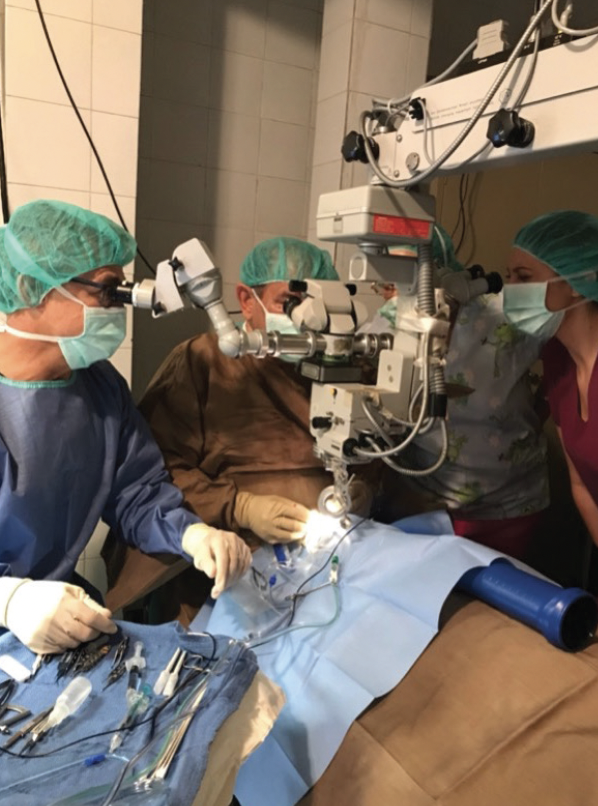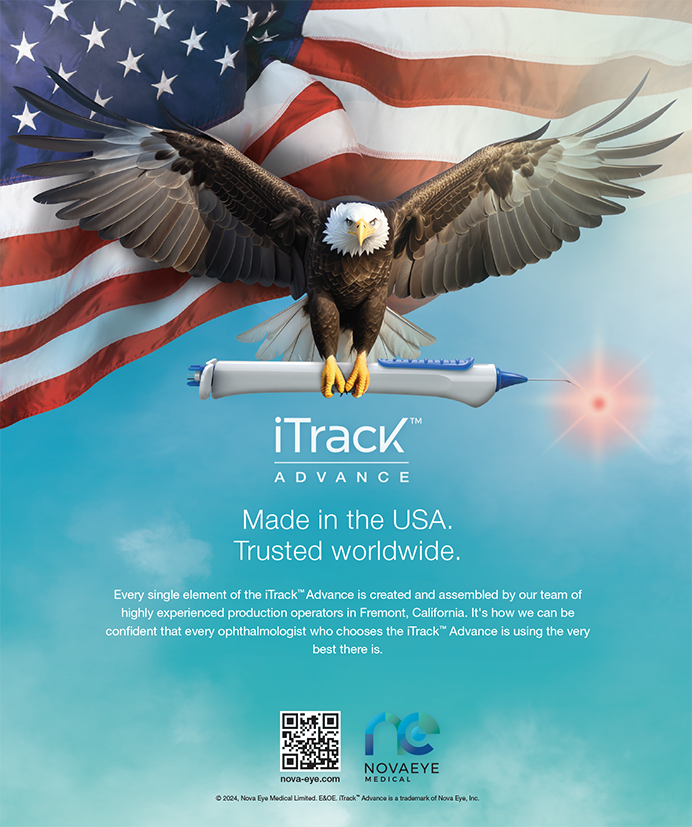Ahh, residency graduation day! Who could forget the laughs and tears shared while recounting memories and the well-deserved roasting you received from your peers? Graduation was a moment filled with pride and reflection on your journey of perseverance and accomplishment. When your program director signed your graduation certificate, they declared you were prepared for the unsupervised practice of ophthalmology. The certificate, however, neither stated nor implied you were prepared for everything a successful career requires, including navigating the perplexing complexities of an inefficient health care system and the business of ophthalmology—all while teaching yourself new technologies and techniques.
Thankfully, no clinician is on their own. Generous mentors, industry partners, and communities of ophthalmologists from countless subspecialty societies remove obstacles and guide your career successes.
The same cannot be said for the subspecialty of global ophthalmology, unfortunately. With few available mentors and no identifiable community, global ophthalmologists have largely been left to the school of hard knocks to guide our engagement … until now.
ENTER THE GLOBAL OPHTHALMOLOGY SUMMIT
What is global ophthalmology? As described by Koplan and colleagues, global health is “fashionable, it provokes a great deal of media, student and faculty interest, has driven the establishment of academic programs, is a crucial component of policy, and has become a major philanthropic target. Although frequently referenced, global health is rarely defined.”1
Using Koplan’s description as a base, the term global ophthalmology can be defined as an area for study, research, and practice that prioritizes improving vision health and achieving equity in vision health for all people worldwide. Global ophthalmology crosses borders, transcends subspecialities, and bridges clinical care, public health, and research and policy.
How did we get here? Historically, global ophthalmology could be divided into public health and nongovernmental organizations focused on community health such as trachoma and onchocerciasis. It did not include individual clinicians who flew (or sailed) to a different country to provide short-term clinical and/or surgical care. These two worlds are slowly integrating, however, thanks to increased ophthalmologist engagement with the nongovernmental organization community to better understand policy and programs that deliver care on a larger scale. The integration is significant and essential for greater impact, but it is not sufficient for facilitating efficient and effective ophthalmologist participation.
What’s happening now? Global ophthalmology practice requires a unique skill set and knowledge beyond traditional residency training. There are currently 10 global ophthalmology fellowships and at least five residency tracks in the United States that help meet the increasing demand for expertise and opportunities and develop the clinical skill set for examination, diagnosis, and management in a low-resource setting where routine decisions can be complicated by limited options for imaging and treatment (see Making an Impact With Global Ophthalmology Fellowships). In addition to manual small-incision cataract surgery, the programs teach routine surgical care, which requires novel adaptations from approaches used in your home OR. Global ophthalmology residents and fellows also gain fluency in the basics of epidemiology and public health.
There has been a simultaneous explosion in other global ophthalmology resources. The AAO Annual Meeting currently offers at least two dedicated global ophthalmology symposia and a global ophthalmology meeting track or filter (much like cornea, retina, and glaucoma). Global ophthalmology sessions or discussions are now common at subspecialty conferences such as the ASCRS Annual Meeting.
What’s next? It is easier than ever to expand your knowledge of and gain fluency in global eye health principles. Much as in medical school, however, the time-honored tradition of mentor/mentee apprenticeship is key to learning the best surgical and clinical practices in global ophthalmology. Access to global ophthalmology experts, like-minded colleagues, and a broader community has been sorely lacking.
The Global Ophthalmology Summit is a direct line of access for any ophthalmologist looking to engage in and find mentored pathways to global eye work. The summit is a culmination of years of work by hundreds in the global ophthalmology community, including representatives from the ASCRS, American Glaucoma Society, American Uveitis Society, North-American Neuro-Ophthalmology Society, American Association of Pediatric Ophthalmology, and American Society of Retina Specialists.
First held in Park City, Utah, in August 2022, the Global Ophthalmology Summit welcomed attendees in person and virtually from 24 countries. The tapestry of participants included employees of the World Health Organization, International Agency for the Prevention of Blindness, Himalayan Cataract Project, Orbis, and Surgical Eye Expeditions International.
The message of the Global Ophthalmology Summit is clear. In isolation, no single person, organization, specialty, or approach can achieve the fullness of ophthalmology’s potential. Our greatest impact as the global ophthalmology community is built through connection, collaboration, and education.
CONCLUSION
Eliminating global cataract blindness is achievable in your lifetime. We need help to make it happen. The second annual Global Ophthalmology Summit will take place in Atlanta from September 8 to 10. With the momentum and energy of last year as fuel, the summit promises to be another think tank that can help you discover which innovations and strategies will take global ophthalmology to the next level.
1. Koplan JP, Bond TC, Merson MH, et al. Towards a common definition of global health. Lancet. 2009;373(9679):1993-1995.
The FOCUS Program
Surgical resources are sorely needed in the developing world.
By Daniel C. Alter, MD, PhD
Resources are sorely needed to create and maintain eye care programs in the developing world, but it can be done. I would know because I have helped to develop three retina surgery sites in Haiti and Rwanda and have a fourth in the works in Burundi, Africa.
My first experience with global ophthalmology came as a midcareer retina specialist. In 2014, I traveled to Port au Prince, Haiti, and had a successful week of teaching vitrectomy surgery to Reginald Taverne, MD (Figure). Since then, I have made 25 trips to Haiti, recruited other visiting retina surgeons to make similar trips, and helped to start a second program in Cap-Haïtien with Luc Dupuy Pierre, MD.

Figure. Dr. Alter (left) and Dr. Taverne (middle) performing vitrectomy in his office-based OR in Port au Prince, Haiti.
These programs were made possible by FOCUS, a 501(c)(3) organization that was founded by three ophthalmologists in 1961 and aims to develop and improve eye care systems in the developing world (to learn more, scan the QR code). The organization’s main mission is to train, mentor, and equip eye care professionals and residency programs in the developing world to reduce the burden of blindness. FOCUS has also developed subspecialty fellowships in Haiti for recent graduates and now has fellows in training for pediatrics, retina, glaucoma, and cornea.
Working with several nongovernmental organizations such as SEE International, corporate sponsors, and academic global ophthalmology programs such as Wills Eye Hospital, Moran Eye Center, and University of Illinois Chicago, FOCUS has concentrated on strengthening the ophthalmology residency program at Hôpital d l’Universite d’Etat d’Haiti (HUEH), the state hospital in Port au Prince, and the residency at nearby Grace Hospital. Projects have included installing water cisterns, storage solutions, examination lanes and equipment, high-speed internet, surgical beds, and surgical video capabilities with large screens; building a wet lab with two microscopes and four operating microscopes; equipping the OR with a green laser, Nd:YAG laser, indirect laser, B- and A-scan ultrasound, and indirect ophthalmoscopes; training clinical coordinators; and providing lenses to all residents. Electricity often goes out during cases at HUEH; electricity is available only about 25% of the time, and the generator is not reliable. We therefore also installed solar panels with marine battery backup. We hope to install a similar or larger unit for the clinic.
Successful resident training at HUEH has been a challenge with the lack of full-time attendings and part-time attendings who are poorly compensated and cannot provide appropriate coverage. The 3-year residency is often interrupted by strikes, lockouts, protests, and other disruptive events. FOCUS now offers postgraduate subspecialty training to recent graduates with a commitment to stay at HUEH after graduation to train residents. FOCUS also provides stipends and five fellows in various subspecialties who have a responsibility to attend and train junior residents.
Making an Impact With Global Ophthalmology Fellowships
When residency nears an end, why not pursue a fellowship in global ophthalmology?
By John C. Anhalt, MD, and Brenton Finklea, MD
The interest among recent medical school graduates to incorporate a global health curriculum into their specialty training is growing. To meet the demand, an increasing number of global ophthalmology (GO) fellowships have emerged in the past 10 years. Each program has unique partnerships and geographic interests with the same collective goal: to equip motivated ophthalmologists with the necessary skills to practice and teach in resource-limited settings ethically. Fellows are exposed to surgical training in techniques such as manual small-incision cataract surgery (MSICS) and public health principles specific to delivering eye care in low- and middle-income countries.
GO FELLOWSHIP DESIGN
A GO fellowship is a 1-year commitment with both domestic and international training goals.
Domestic training. At home institutions, fellows are closely involved in resident education and may partake in public health didactic training. Additionally, faculty members train fellows on advanced surgical skills and techniques in anterior segment surgery. Many fellowships provide opportunities for fellows to play a vital role in addressing the eye care needs of local underserved communities through community outreach clinics.
International training. While abroad, fellows train under leading surgeons in India, Sub-Saharan Africa, and Latin America to learn skills in MSICS. More importantly, fellows have an opportunity to observe how these individuals and affiliated institutions continue to excel at closing the gap in delivering high-quality eye care for their communities. Each international GO training setting has unique obstacles. Under the guidance of local providers, GO fellows learn how lessons in public health translate to real-world scenarios.
A GLOBAL NETWORK
Some of the most meaningful experiences of a GO fellowship happen outside hospital walls. Partnerships evolve into lifelong friendships over chai breaks between cases or a lengthy bus ride on community outreach missions. A GO fellowship is a springboard for a global network of colleagues.
There is nothing new about US-trained ophthalmologists sharing their surgical expertise in restoring eyesight abroad. We are, however, witnessing a paradigm shift in how that service is provided. Both US-based academic centers and private physicians focus more on education, capacity building, and skills exchange.
Equipped with fresh insights from residency, many fellows invest their wealth of knowledge and energy in training the next generation of ophthalmologists. A GO fellowship is one of the most impactful contributions fellows can make at this stage of their training. Fellows can stand on the shoulders of the GO giants who pioneered the subspecialty.
In 2022, the AAO joined forces with the growing academic GO community to host the first annual Global Ophthalmology Summit. The meeting sprang from a collective interest among GO fellowship programs to provide incoming fellows with an opportunity to network and pool academic resources with group didactic and wet lab training.
CONCLUSION
It is an exciting time in academic GO. We encourage young ophthalmologists to consider a GO fellowship to advance their surgical skills, form career-long relationships, and learn from the leaders in the field who are closing the gap in eye care for their communities.




